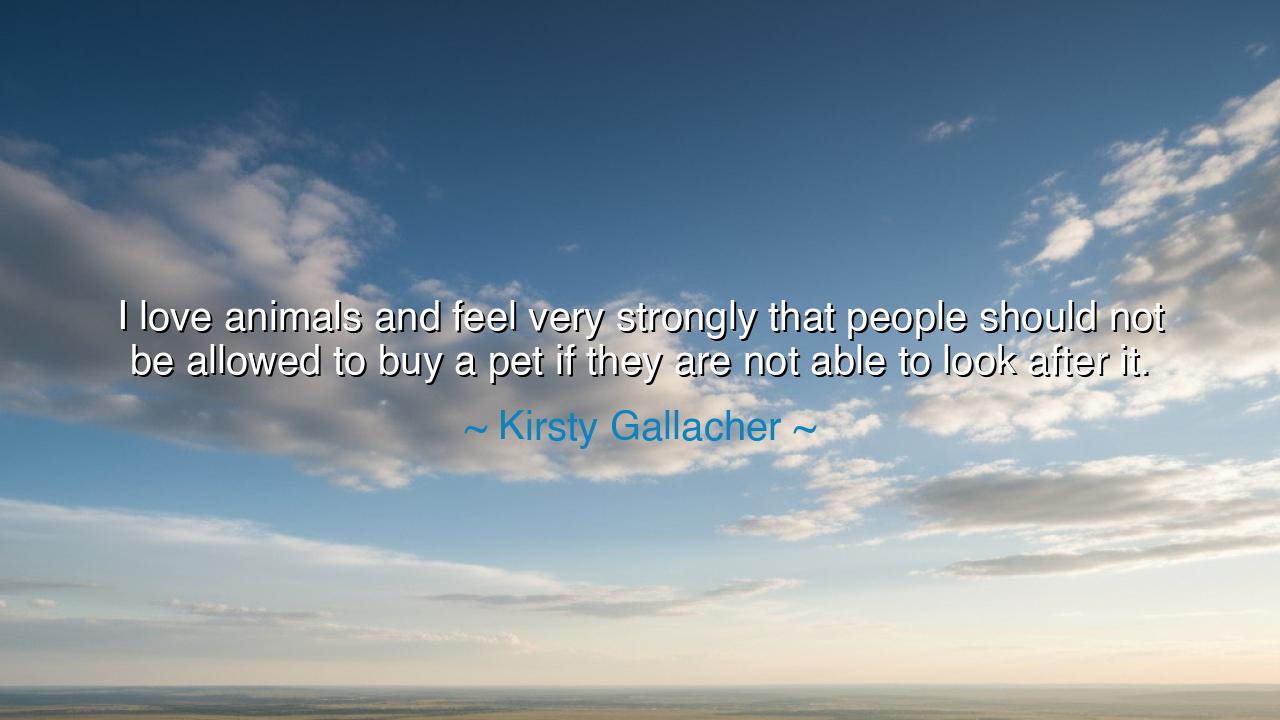
I love animals and feel very strongly that people should not be
I love animals and feel very strongly that people should not be allowed to buy a pet if they are not able to look after it.






Hear, O keepers of compassion, the words of Kirsty Gallacher, who declared with conviction: “I love animals and feel very strongly that people should not be allowed to buy a pet if they are not able to look after it.” In this saying lies not only the tenderness of affection for creatures but also the solemn weight of responsibility. For love, if it is true, does not take lightly the lives of the innocent; it bears the duty to protect, to nourish, and to honor the trust of those who cannot speak for themselves.
The ancients knew that stewardship was sacred. To be given charge over flocks, herds, or companions of the wild was not a privilege to be squandered but a duty before the gods themselves. A pet is not a toy, nor a decoration, but a life entrusted to human care. Gallacher reminds us that neglect of this truth is betrayal—that to welcome an animal without the means or will to care for it is not love but selfishness, cloaked in false affection.
Consider the tale of Hachikō, the loyal dog of Japan. Each day he waited at the train station for his master, even years after the man’s death. His devotion became legend, a symbol of fidelity beyond death. Yet how tragic it would have been had his master neglected him, had he been taken by one unprepared to meet his needs. The greatness of Hachikō’s story is possible only because he was cared for faithfully. Gallacher’s warning ensures such devotion is not wasted on the careless, but matched with guardians worthy of it.
Her words also echo the plight of countless abandoned animals. Shelters across the world are filled with those once bought in excitement but later discarded in inconvenience. The failure of responsibility is not the animal’s, but the human’s who sought comfort without commitment. This is why Gallacher insists upon boundaries: if one cannot care, one must not claim. For ownership without responsibility is not ownership at all—it is cruelty in disguise.
In this teaching lies a mirror for all human relationships. Just as one must not take in a pet without care, so must one not enter into bonds of love, friendship, or duty without readiness to uphold them. Life is not about possession but guardianship. To hold another being’s well-being in your hands—whether animal or human—is a sacred trust, one that defines the true measure of character.
The lesson, therefore, is clear: before you choose to love, count the cost of responsibility. If you cannot feed, protect, and cherish, then do not take. If you cannot endure inconvenience, do not claim joy. Better to abstain than to wound. But if you do accept, then accept fully, with devotion that does not falter. For love without responsibility is hollow, but responsibility wedded to love is the highest virtue.
Practically, this means preparing before adopting. Learn the needs of the creature, measure your time, your resources, your patience. Do not act on impulse but on wisdom. Support shelters, foster if you cannot commit long-term, and speak against those who treat animals as commodities. Let your care be deliberate, steadfast, and whole.
So let these words endure: “Do not claim what you cannot care for.” In this is the essence of Gallacher’s wisdom. To love animals is noble; to love them responsibly is divine. Let each choice we make honor not only our desires but the lives entrusted to us, for in such choices, the measure of true humanity is revealed.






AAdministratorAdministrator
Welcome, honored guests. Please leave a comment, we will respond soon